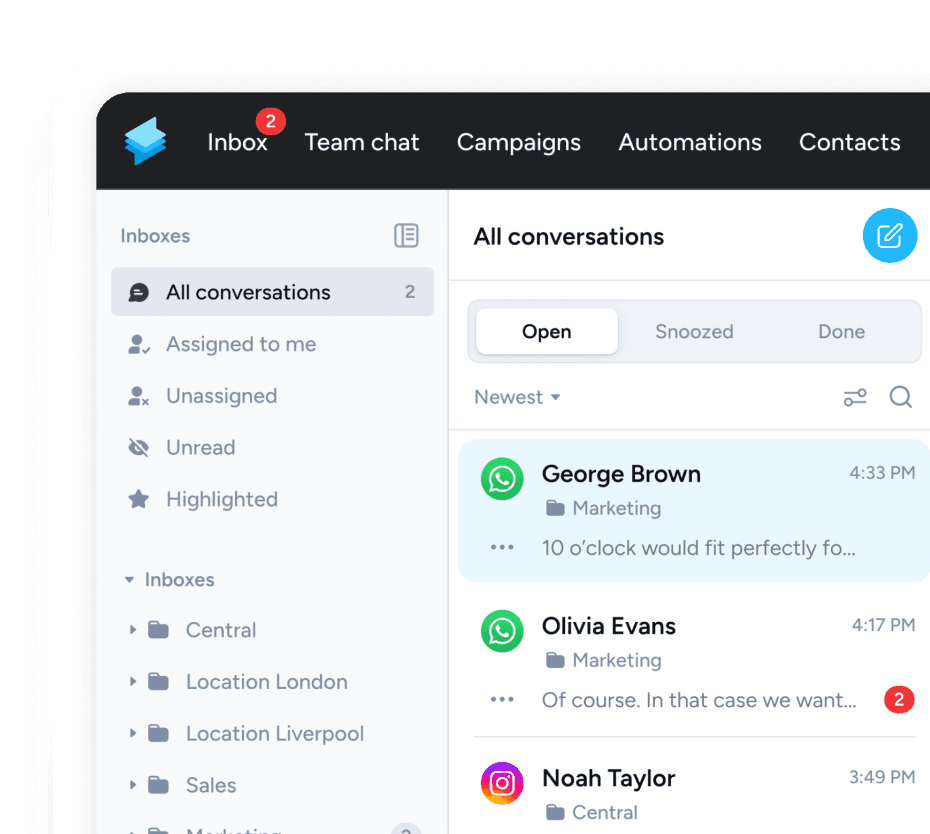AI chatbots from different providers enable companies to automate customer communication. By using AI chatbots, businesses can save both time and costs in customer service while sustainably improving efficiency and customer satisfaction. But what lies behind these technologies? What advantages do they offer, and where are their limitations?
This article provides a comprehensive overview of the world of chatbot providers. We highlight the strengths and weaknesses of AI chatbots and demonstrate how businesses can use them successfully. Additionally, we introduce 11 of the most popular chatbot providers and offer practical tips to help you choose the right provider for your individual needs.
Are you curious about how an AI chatbot works in practice? Scan the QR code to experience our AI chatbot live in action.

What are AI chatbots?
It is important to distinguish between AI chatbots and AI-powered solutions. While AI-powered tools like GitHub Copilot assist with specific tasks such as code suggestions, data analysis, or project management, they are not dialogue-oriented. Another example is Superchat's AI copilot, which supports tasks such as responding to messages, translations, and many other activities.
AI chatbots go a step further—they are digital assistants that use artificial intelligence to conduct human-like conversations. They answer questions, provide information, perform tasks, and solve complex problems in natural language. Thanks to large language models (LLMs) such as ChatGPT, they understand the context and intent behind user inputs. Additionally, they improve through user interactions and provide context-based, dynamic responses.
AI chatbots offer significant benefits for companies, especially in customer communication. They provide 24/7 availability, reduce wait times, and lower operational costs by handling routine inquiries and easing the workload of service teams. Another key application is in sales, where they can offer tailored product recommendations or pass qualified leads to the sales team.
AI chatbots vs. traditional chatbots
Another important distinction is between AI chatbots and traditional chatbots. Traditional chatbots rely on predefined rules and scripts. They operate using decision trees and keywords, which limit the scope of their responses. These chatbots are best suited for answering frequently asked questions and collecting structured data.
This article focuses on the use of AI chatbots in customer communication rather than internal applications. For internal collaboration, there are specialized solutions like Slack AI and Notion AI that facilitate teamwork through functions such as summarizing data and documents.
This differentiates them from general-purpose AI chatbots like ChatGPT, which are highly versatile and can be used across almost all business areas—whether for research, brainstorming, content creation, or proofreading.
The strengths of AI chatbots
AI chatbots offer a wide range of advantages that help businesses make their customer communication more efficient and cost-effective. They are ideal for handling large volumes of inquiries and automating simple tasks without compromising quality.
1. Efficiency and scalability
Thanks to their ability to handle multiple requests simultaneously, AI chatbots can provide fast and consistent service even during peak times. This not only saves significant time but also reduces the workload of your employees.
2. 24/7 availability
One of the biggest advantages of AI chatbots is their round-the-clock availability. Whether your customers need support at night, on weekends, or during holidays, the chatbot is always ready to provide top-notch support.
3. Personalized communication
With advanced language processing, AI chatbots seamlessly adapt to your brand's tone and offer personalized conversations that enhance the customer experience. They can provide context-aware responses and make relevant recommendations.
4. Continuous learning and improvement
Through machine learning, AI chatbots improve their performance with every interaction. They recognize patterns and continuously optimize their responses, leading to higher communication quality over time.
5. Multi-channel support
By using messaging software, AI chatbots can easily integrate with various communication channels such as websites, social media platforms, or messaging services. This ensures consistent customer communication across all channels.

The weaknesses of AI chatbots
Despite their strengths, AI chatbots have some minor weaknesses that should be considered during implementation. These mainly relate to specific use cases and the correct way to use the technology.
1. Limited capability in complex and emotional situations
AI chatbots excel at handling clearly defined and simple inquiries. However, they reach their limits in complex or emotionally charged situations, as they cannot understand human empathy or situational nuances. This makes them less suitable for deep, personal consultations. Therefore, it is advisable to use AI chatbots that can easily hand over conversations to human agents when needed.
2. Hallucinations and incorrect answers
A common criticism of AI chatbots is the phenomenon known as "hallucination," where chatbots provide incorrect or fabricated information. This issue arises especially when the underlying dataset is incomplete or faulty. By uploading a high-quality dataset and continuously updating it, this problem can be well managed. Additionally, the error rate of AI continues to decrease over time.
3. Technological and legal requirements
AI chatbots require regular technological updates to stay up to date. Companies must also ensure compliance with data protection regulations, such as the GDPR, especially when processing sensitive customer data.
Today, the advantages outweigh the disadvantages: AI chatbots offer fast, scalable, and cost-efficient customer service that continually improves. The weaknesses of AI chatbots can be minimized by choosing a high-quality AI chatbot, implementing it carefully, and maintaining a strong data foundation. When choosing an AI chatbot, several quality criteria should be taken into account.
What makes a good AI chatbot?
The quality of AI chatbots varies significantly, and many crucial criteria are not immediately apparent at first glance. Companies should therefore carefully assess which solution best meets their individual requirements. The needs of a small startup differ greatly from those of a large enterprise in terms of features, scalability, or budget. The following factors should be considered when selecting an AI chatbot:
1. Cost
The cost of an AI chatbot varies greatly depending on its features, technology, and provider. Companies should consider not only the initial costs for development and integration but also the ongoing costs for maintenance, updates, and potential expansions. A detailed cost comparison helps find the solution that offers the best value for money and fits your long-term budget. At Superchat, an AI chatbot is included in the Professional Plan.
2. AI language model
The underlying language model determines how precise and natural the chatbot’s communication is. A powerful model is essential to correctly understand customer queries and deliver context-appropriate responses. Superchat is based on OpenAI's GPT-4 language model.
3. Data protection
Protecting sensitive customer data must be a top priority. Ensure that the chatbot complies with data protection regulations such as the GDPR and securely processes your data. Superchat and its AI chatbot are 100% compliant with data protection laws.
4. Data requirements and database integration
Consider your data processing needs. Do you require integration into a comprehensive database for complex processes, or is a simple FAQ solution sufficient? The requirements of your industry and customers determine how robust the data integration needs to be. Superchat offers numerous integrations for tools like HubSpot CRM, Zoho CRM, and Pipedrive.
5. Use cases
AI chatbots can be used in various areas. While some providers offer specialized solutions for customer support, others provide platforms with versatile use cases such as sales and marketing. Superchat's AI chatbots can be used for all aspects of customer communication.
6. Supported communication channels
Not every chatbot supports all communication channels equally. Check whether the chatbot is compatible with the platforms your customers use, such as websites, WhatsApp, and social media. Superchat's AI chatbots can be deployed on platforms such as WhatsApp, Instagram, Facebook, Telegram, and web chat. However, AI chatbots are generally not compatible with email platforms.
7. Control options
An effective AI chatbot integration should always provide the option to manually intervene in conversations. This allows you to maintain control over customer interactions and provide targeted support for complex or sensitive inquiries. With Superchat, you can personally step into the AI chatbot's conversation at any time, ensuring you remain in full control.
8. Easy setup
A good AI chatbot should be easy and quick to integrate into existing systems. Long and complicated installation processes can unnecessarily tie up resources and delay implementation. Superchat’s AI chatbot can be set up in just three steps.
9. Customization
The chatbot should be flexible enough to be tailored to your brand and customer requirements. The ability to configure language, tone, and features individually leads to a significantly better user experience. Superchat offers a test environment where you can easily test the prompts and data foundation of the AI chatbot.
11 popular AI chatbots
Once you have determined the use cases and budget for your company, you can compare various AI chatbot providers. It is important to distinguish between messaging software with integrated AI chatbots, chat software, and CRM software. Messaging software allows you to deploy AI chatbots not only on your website but also effectively on platforms such as WhatsApp and social media.
1. Superchat (messaging software)
Superchat is a messaging software that allows businesses to centralize customer interactions across multiple channels such as WhatsApp, email, SMS, Facebook, and Instagram into a single inbox. This simplifies team workflows and enables the automation of many processes. This is why Superchat is a leading chatbot provider with over 5,000 satisfied customers.
2. Trengo (messaging software)
Trengo is a messaging software with integrated AI chatbots that enables businesses to centralize and automate customer communication across multiple channels. The platform supports efficient workflows and smooth handling of inquiries.
3. Sinch Engage (messaging software)
Sinch Engage is an all-in-one platform for the professional use of WhatsApp and other messaging apps for marketing, sales, and customer service. It offers automation features and chatbot integration.
4. Userlike (messaging software)
Userlike offers live chat software for websites and messaging apps, allowing businesses to communicate with customers in real time. The platform integrates various channels and supports automation through AI.
5. moinAI (chat software)
moinAI is an AI-based platform for digital customer communication that includes chatbots, live chat, and product consultation. It enables businesses to communicate with customers on their website efficiently around the clock.
6. Melibo (chat software)
Melibo provides a customer service automation platform that includes features such as ticket automation, product assistants, live chat, and chatbots. The goal is to optimize customer service and increase customer satisfaction.
7. OMQ Chatbot (chat software)
OMQ develops AI-based solutions for customer service automation, including chatbots, email bots, and help pages. These tools aim to enhance efficiency and improve the quality of customer support.
8. BOTfriends (chat software)
BOTfriends offers a conversational AI platform for creating chatbots and voicebots without coding skills. It helps businesses provide 24/7 customer support and automate processes.
9. Assono (chat software)
Assono develops AI chatbots and voicebots for businesses to automate processes and efficiently handle customer inquiries. Their solutions are tailored to the specific needs of their clients.
10. Intercom (crm software)
Intercom is an AI-powered customer service platform that provides tools for messaging, automation, and customer support. It allows businesses to deliver personalized support across various channels.
11. Zendesk (crm software)
Zendesk offers CRM software for customer service and sales, including features for messaging, live chat, AI, and automation. The platform helps businesses improve customer service and increase efficiency.
Conclusion: Create and test an AI chatbot yourself
When choosing the right AI chatbot, you should consider several criteria, including data protection compliance, compatibility with your company’s communication channels, seamless collaboration with employees, and ease of use.
The AI chatbot from Superchat meets all these requirements. The comparison of the presented solutions shows that AI chatbots are highly versatile, whether for customer support, sales, or process automation.
The combination of artificial intelligence and human support proves to be particularly effective. While AI chatbots automate routine tasks and provide quick responses, human agents can step in for complex or sensitive issues. WhatsApp Business, by far the most popular messaging platform, is an excellent choice for this purpose.
With the right AI chatbot, businesses can reduce operational costs, increase efficiency in customer communication, and sustainably improve customer satisfaction. Now is the ideal time to implement this technology in your business, as artificial intelligence and AI chatbots continue to become more powerful.
Are you ready to discover the benefits of an AI chatbot for your business? Try the Superchat AI chatbot for free and see its capabilities for yourself. With this guide, you can create an AI chatbot in four simple steps.

